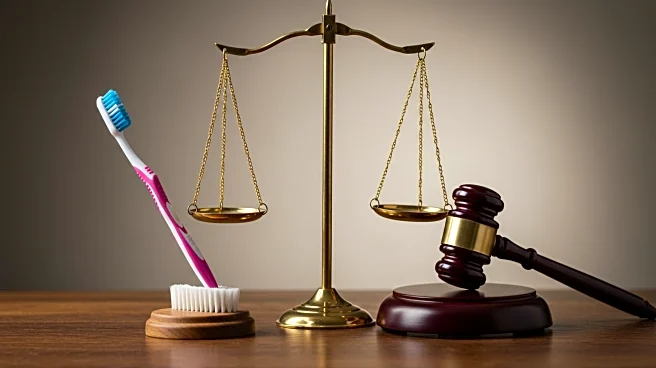What is the story about?
What's Happening?
The Justice Department has raised concerns about providing toothbrushes to migrants detained at a Manhattan ICE facility, arguing that these items could potentially be used as weapons. This stance follows a judge's order to improve conditions at the makeshift jail located at 26 Federal Plaza, where asylum seekers have reportedly been held in unsanitary and overcrowded conditions. Manhattan US Attorney Jay Clayton's office suggested that toothbrushes could be improvised into dangerous tools, advocating instead for the use of teeth-cleaning wipes. Despite the lack of evidence of toothbrushes being used as weapons by migrants, the court has temporarily banned them pending further discussions. The issue arises amidst criticism of ICE's aggressive tactics, including arrests of migrants outside immigration court hearings, which a federal judge described as unconstitutional.
Why It's Important?
This development highlights ongoing tensions between federal authorities and advocates for migrant rights regarding the treatment of detainees. The Justice Department's position reflects broader debates over security versus humane treatment in detention facilities. The decision to withhold basic hygiene products like toothbrushes could impact the health and dignity of detainees, drawing criticism from human rights groups. Additionally, the aggressive enforcement tactics by ICE, as criticized by a federal judge, underscore concerns about due process and the treatment of migrants within the U.S. legal system. These issues could influence public opinion and policy discussions on immigration enforcement and detainee rights.
What's Next?
Further legal arguments are expected regarding the provision of toothbrushes and other hygiene products to detainees at the Manhattan ICE facility. The court's decision on this matter could set a precedent for other detention centers across the country. Additionally, continued scrutiny of ICE's enforcement tactics may lead to policy changes or increased oversight. Stakeholders, including migrant advocacy groups and legal experts, are likely to continue challenging practices they view as inhumane or unconstitutional, potentially leading to broader reforms in immigration detention policies.
















